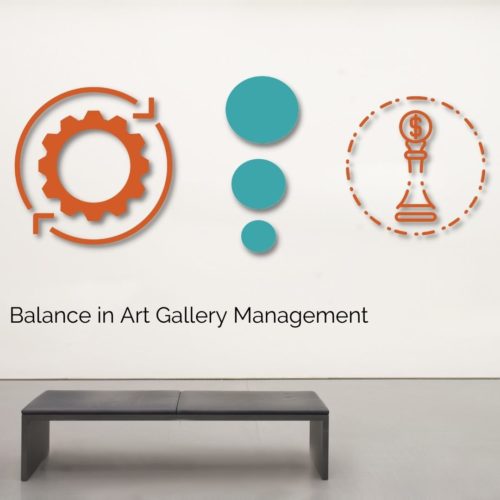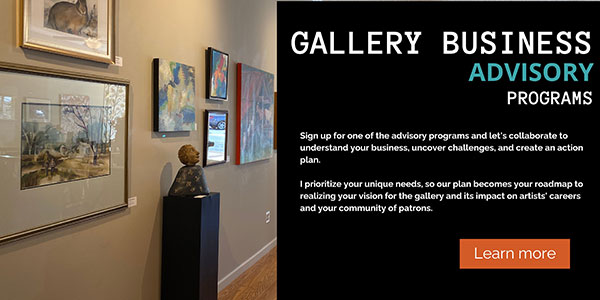 In your job of gallery management, much of your day requires you to spend time with collectors and artists, hang exhibitions, pack sold pieces for shipping, update your website and e-commerce sites, and maintain social media. I’m sure that is not all you do on a given day either.
In your job of gallery management, much of your day requires you to spend time with collectors and artists, hang exhibitions, pack sold pieces for shipping, update your website and e-commerce sites, and maintain social media. I’m sure that is not all you do on a given day either.
Like many of my clients, you might feel you don’t have proper balance in your duties managing the gallery between operational and strategic management. Let’s look at the difference.
Operational Gallery Management
Operational management of the gallery involves all the day-to-day tasks that include things like:
- sales and marketing implementation
- client and artist communications
- bookkeeping
- scheduling repairs
- hanging shows, etc.
Effective gallery operational management usually needs constant tweaking to improve efficiency, quality control, and client satisfaction.
Managing art gallery operations takes a lot of time every week, and you might even multitask some of your duties. Sometimes these kinds of tasks feel easier than strategic ones. As a result, it’s too easy sometimes to get lost in them and always stay very busy but not developing the business to be stronger and nimbler.
Strategic Management of an Art Gallery Business
There is often less time devoted to strategic gallery management. This requires understanding all the competitive and market forces in your corner of the art world. Strategic gallery management also means grasping what the gallery’s strengths and weaknesses are and how they shape the future direction of the business.
Strategic art gallery business decisions include things like:
- developing or editing your gallery program, business model, artist roster,
- create staff positions
- create comprehensive sales and marketing plans
- consider expansion opportunities, etc
Strategic annual gallery business plans should be created to be flexible to adapt to change when necessary and keep you motivated and focused on your goals.
Get More Done Managing the Gallery with Less Stress
There are the things you do in your gallery: the day-to-day tasks, but are you devoting enough time on your gallery business? How much strategic time each day, week, and month do you work on your business’s growth and long-term development?
Let’s talk about how to find a nice balance in art gallery management responsibilities, so you can get more done with less stress.
The gallery sector has an unconscious tendency to stick with what they know best, often the everyday tasks. These are just enough to keep your business running. Still, if you focus your efforts only on operational management, your art gallery business will eventually get outflanked by competitors.
I also hear from many clients that they have a vision for their gallery business but are unsure how to get there in the best way.
That could leave you feeling burnt-out, frustrated, and stagnant.
Working on the equally important business development tasks as part of strategic management can feel uncomfortable – I totally get that and have thought that myself at times. But, ignoring these areas can put you out of business, especially in this current art market when things are evolving at warp speeds, and collector expectations are expanding every year.
Finding a New Way to Approach Time Management
Positive change might come down to your ability as a gallery leader to rededicate yourself to your business’s growth. But first, you need to find balance in your time management. In doing so, you will make room for more strategic thinking about running the gallery business.
In the process, you may also inspire your artists, staff, and art collectors to play a more active role in your gallery. Success will depend on committing to the necessary tasks and giving yourself the time to do them.
First Step to Balancing your Focus
Here are some suggestions on how to get started in finding the right balance for more effective art gallery management.
- An excellent place to start is to identify the day-to-day, operational tasks that you spend the most time on every week, which may be holding you back from working on more strategic projects. Determine how frequently they really need to be done. Can some similar tasks be batched together to make the process easier? For example, Marketing Monday, Finance Friday, etc.
- Batching similar tasks is a clever trick to help you stay in the best, most focused mindset. Give it a try to see you complete them faster and more efficiently.
- Look for ways these tasks can be completed more efficiently with better tech. New software and tools are constantly coming out—Check Gallery Fuel’s Alternative Fuel page, where I list some of my favorites.
- Consider if delegating particular tasks could free up time for you and what opportunities that newfound time provides.
The next logical step is to outline the tasks crucial to your gallery’s future growth and are not receiving your focused attention. Here is where we get into making more time and balance for strategic gallery management.
Think about the goals and aspirations you have for the gallery 3-5 years from today. How will you get there? Through strategic management of the gallery business.
Be specific and break these strategic tasks into categories: marketing, finance, artist development, sales, etc. Then prioritize them and schedule reoccurring days and blocks of time to work on those tasks.
Another trick that people often use is to keep their calendar and to-do lists together. This way, you can clearly see how to schedule time for focused work.
Having a written annual plan comes in handy as well. It’s nice to get all your goals and ideas out of your head and written down where you can refer back to it if you even lose focus and need to regroup. I put a template together in a spreadsheet if you want to use it to plan and schedule operational and strategic tasks and workflows. You can get it here.
Now you have some clarity about allocating your time to find a better balance between operational and strategic gallery management.
Develop Skills for Better Time Management
Are you constantly being pulled away from a task to assist an untrained gallery employee? Do you know who much time you actually spend on emails, client phone calls, chatty vendors or staff, or scrolling social media? Be honest….
Do you find that you spend too much time on things that don’t significantly impact your gallery’s progress towards your goals in the grand scheme of things?
Try a few of these techniques to help you build better time management skills.
- Delegate as much as you can. If you don’t have staff capable of taking tasks off your shoulders, train them. If staff is stretched thin, use outside help in contractors or virtual assistance.
- Don’t overbook yourself with too many appointments or try to participate in too many art fairs. Learn to say no.
- Commit to one hour a day for strategic work (Yep, every day)
- Write out workflows or steps involved in repetitive tasks, such as creating the gallery newsletter, preparing for a fair, or following up on sales leads. The exercise of writing out each step (in an ideal world) can often enable you to see ways to make those processes more efficient. These tasks outlined in writing also make it easier to delegate to someone else and maintain quality.
- Use downtime productively (reading Gallery Fuel, taking online courses, even cleaning out your inbox)
- Try a new tool for time management, such as app blockers or time trackers. Sometimes turning tools off is helpful, like your email and phone. There are so many tools coming out all the time designed to help you focus and manage time.
- Batch tasks, such as creating all your social media posts for the month in one sitting. Use automation to schedule newsletters and other emails.
- Pick a new professional skill that would make you better in any area of your job and master it.
- Evaluate your internal processes to determine more efficient ways to accomplish them.
To the Point
It’s hard to balance operational gallery management obligations and growing and developing your art gallery with excellent strategic management.
Small businesses need to look to the future continually. This requires working on the company as well as in it daily. Running an art gallery is no different.
If you don’t have balance, your gallery can’t grow. You will not be able to serve your artists, staff, or art collectors very well either. It is easy to get caught up in the daily rhythm and lose sight of where the business is going.
Make a real commitment to managing your time with a balance of both operational and strategic gallery management. You will be successful in growing your gallery for the future.
And hey – You might find you fall in love with your job all over again.



I am curious.